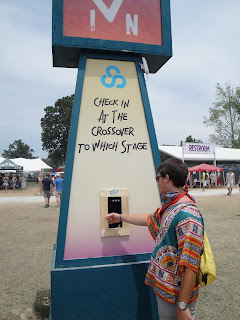Dr. Meng and all of the Center’s all doctoral students (Pei Zhang, Hengyun
Li, Rui Qi, and Jing Li) attended the 2016 Annual International Conference of
Travel and Tourism Research Association (TTRA) in Vail, Colorado. Dr. Meng and Hengyun Li delivered a standup
presentation, which was recognized as one of the top three finalists for the
Best Paper Award.
The Richardson Family SmartState Center of Economic Excellence in Tourism and Economic Development was established in 2010 with a specific goal to encourage research directly applicable to tourism in South Carolina.
Friday, June 24, 2016
Monday, June 6, 2016
Social Media a Hot Topic!
Simon
Hudson’s journal article on the use of social media by music festivals (written
with his son Rupert in 2013) was the most downloaded paper published in the
International Journal of Events and Festival Management in 2015. The paper
called ‘Engaging with consumers using social media: a case study of music
festivals’ has been downloaded nearly 9,000 times since 2013. The
Hudsons used a case study methodology with a multi-method approach to analyze
the use of social media at three major music festivals. In general, they found
that the music festivals profiled were proactive in their use of social media,
engaging with consumers throughout the consumer decision journey. In
particular, social media is making the “evaluate” and “advocate” stages of the
decision journey more relevant for festival marketers. The paper can be found
at: http://www.emeraldinsight.com/doi/abs/10.1108/IJEFM-06-2013-0012
Friday, June 3, 2016
USA eShop named South Carolina Small Business Exporter of the Year
An
incubator company supported by our SmartState Center was recently awarded
the Small Business
Exporter of the Year for South Carolina. USA eShop is a global e-commerce website led by
Jerry Smith and John Wilkinson (above). Since it’s inception in 2012, it
has carved out a niche market in the e-commerce business, selling
quality American-made goods to European consumers. “Like all entrepreneurs, you
have to be willing to take a risk," Smith stated in a feature for Cola
Daily. That risk has paid off tremendously. USA eShop now operates a
warehouse in Europe, out of which it sells products from over 125 small to
mid-sized US manufacturers. USA eShop handles everything from export logistics
and fulfillment operations to sales and customer service, simplifying the
process for manufacturers that want to penetrate international markets. The SmartState
Center partners with the USC/Columbia incubator to support the development and
growth of innovative companies that show promise for creating jobs and economic
benefits to the state of South Carolina. Wilkinson mentions how support from
the Incubator has helped their company get to this point. “In terms of the
physical space, the IT and all the support and programs they offer, they have
been key to our success,” said Wilkinson. Read
the full summary of the SBA awards from Cola Daily for more
information about
USA eShop and other awardees.
Wednesday, June 1, 2016
Check out the new publications from the SmartState team!
Cardenás, D., Hudson, S., Meng, F., & Zhang, P.
(2016) “Understanding the benefits of
school travel: An educator’s perspective”, Tourism Review International, 20(1), 29-40.
Abstract
Using a theoretical framework that
incorporates Aristotle's three intellectual competencies (epistme, techne, and
phronesis), this article examines the perceptions of educational travel from
the administrators' perspective. A total of 336 elementary, middle, and high
school principals from around the US participated in the study and thematic
responses were analyzed from open-ended questions. Results indicate that
educational field trips can have positive impacts on all three of Aristotle's
intellectual competencies (practical knowledge, skills, and
attitude/experience), and that the effects of educational travel are far
reaching with substantive benefits for students of all grades.
Hudson, S., Cardenás, D., Meng, F., & Thal, K. (2016)
"Building a place brand from the
bottom up: A case study from the U.S.”, Journal
of Vacation Marketing. Online first, doi:
10.1177/1356766716649228
Abstract
In an increasingly competitive
global marketplace, the need for towns and cities to create a unique identity,
to differentiate themselves from competitors, has become critical. Many places
promote spectacular scenery, good quality of life, friendly people, and a sound
business infrastructure. However, these factors are no longer differentiators,
so places need a strong brand identity to stand out in order to attract people
to live, work and play. But brand development is often driven by short-term
top-down approaches with limited community participation, where the primary
tool of brand expression becomes the final marketing campaign. This paper
reports on a qualitative approach to build a place brand from the bottom up,
with wide participation from all members of the community. With a methodology
based on place brand building theory, charettes and in-depth interviews were
conducted with local stakeholders, resulting in a positioning statement that
was used to develop brand communications materials. Based on the research
process and results of the case study, the authors present a community-based
place brand development model.
Hudson, S., & Hudson, L.J. (2016). “Designing ski resorts – from theory to practice.”
In Harold
Richins & John Hull (Eds.) Mountain Tourism: Experiences, Communities, Environments
and Sustainable Futures, CABI:
Wallingford OX, pp. 331-340.
Abstract
This chapter takes a look at the design and planning process for
ski resorts, which involves the
following key stages: gaining development
approval; analyzing site feasibility; deciding on design
guidelines; and
choosing development styles. Included is a case study about arguably the
world's most successful ski resort designer, Paul Mathews, and his company,
Ecosign, based in Whistler, British
Columbia.
Subscribe to:
Comments (Atom)


